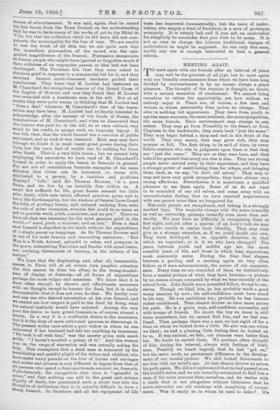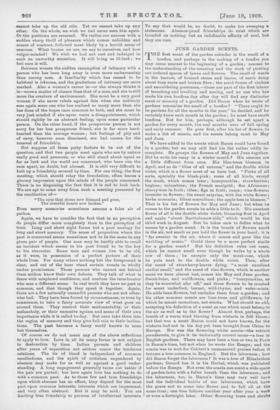MEETING AGAIN.
TO meet again with our friends after an interval of years may well be the greatest of all joys, but to meet again with our friendly acquaintance from whom we have been long divided by circumstances is by no means always a great pleasure. The thought of the reunion is fraught, no doubt, with a certain sensation of excitement. We cannot bring ourselves to refuse the opportunity, yet how seldom we ŌĆó entirely enjoy it. There are, of course, a few men and women in whose personality time makes no changes They. alter in nothing but appearance. They have from youth to age the same manners, the same interests, the same sympathies,. the same friends. Their environment may change to any. extent. They may go from Piccadilly to the desert, or from Clapham to the backwoods; they come back "just the same.". They may begin behind, a shop and end in the front of the world. They may marry, they may grow rich, they may prosper or fail. The first thing to be said of them by every fellow-creature who sits in judgment upon them is that they, are "just the same." They are as they were born, and they
take it for granted that every one else is also. They are strong people never carried away by their experience, and they have a strange power of annihilating time for others, aud bringing them back, as we say, "to their old selves." They may or may not have very quick sympathies; they have always very strong affections. Nevertheless it is sometimes a qualified pleasure to see them again. Some of us do not want to be reminded of our old selves, and come away with an uncomfortable feeling that we have renewed acquaintance with one person more than we bargained for.
But such people are exceptional, and belong to, a strongly marked type. The majority change with the years inwardly as well as outwardly, perhaps inwardly even more than out- wardly. We may have no difficulty in recognising them at first sight, and yet after a quarter of an hour's talk we may feel quite unable to realise their identity. They may even give us a strange sensation, as if we could doubt our own. They have developed in an opposite direction to that which we expected; or is it we who have changed? The years between youth and middle ago are the . most eventful years of life, and those in which long separations most commonly occur. During the time that elapses between a parting and a . meeting again we very often. follow, as it were subconsciously, the career of our acquaint- ance. Every time we are reminded of them we instinctively form a mental picture of what they have become,ŌĆöa picture by no means always corrected by what we hear casually of the actual facts. John Smith was a conceited fellow, we say to our- selves. Though we liked him, he has probably made a good many enemies by now; his self-confidence must have stood in his way. He was ambitious too ; probably he has become rather embittered. Then chance throws us once more across his path. He is a grave man, self-confident, successful, and with troops of friends. No doubt the boy we know is still there somewhere, but we cannot find him, and we feel eon- fused. Then perhaps there was a man we lost sight of for a time on whom we looked down a little. He also was one whom we liked; we had a pleasing little feeling that ho looked up to us. It was natural, we felt; our chances were better than his. No doubt he envied them. We perhaps often thought of him during the interval, always with feelings of kind- ness. Possibly we heard vaguely that he had " got on," but the news made no permanent difference to the develop- ment of our mental picture. , We still looked downwards to see him with our mind's eye. At last chance throws us across his path again. We did not understand that he had passed us ma the world's stairs, and we are inwardly astonished to find him a man of far more account than ourselves, and we realise with a smile that is not altogether. without bitterness that he must remember our old relations with. something of amuse- . meat. Was it really us to whom lie used to defer? We
cannot take up the old role. Yet we cannot take up any other. On the whole, we wish we had never seen him again. Or the positions are reversed. We realise our success with a sudden sharp thrill of pleasure which comes unbidden and comes of contrast, followed most likely by a horrid sense of remorse. What brutes we are, we say to ourselves, and how vulgar-minded We wish we had not met and indulged in such an unworthy sensation. It will bring us ill-luck ; we feel sure it will.
Between women the sudden resumption of intimacy with a person who has been long away is even more embarrassing than among men. A familiarity which has ceased to be habitual is irksome, and the gradations of intimacy are more marked. Also a woman's career isŌĆöor she always thinks it isŌĆömore a matter of chance than that of a man, and she is still more the creature of environment. She must be a very good woman if she never rebels against fate when she suddenly sees again some one who has realised so many more than she has done of the hopes once common to both, and she must be very just minded if she never vents a disappointment, which should rightly be an abstract feeling, upon some particular person. On the other hand, if the prosperous person is not sorry for her less prosperous friend, she is far more hard- hearted than the average woman ; but feelings of pity and of envy, however soon dismissed, are bad omens for the renewal of friendship.
But suppose all these petty factors to be out of the
question, and that two people meet again who are by nature really good and generous, or who still stand about equal so far as luck and the world are concerned, who have run the race apart, no doubt, but abreast. It is still very difficult to knit up a friendship severed by time. For one thing, the first meeting, which should relay the foundation, often leaves a gloomy impression upon the minds of the people concerned. There is no disguising the fact that it is sad to look back. We are apt to come away from such a meeting possessed by the recollection ofŌĆö
"The eyes that shone now dimmed and gone, The cheerful hearts now broken."
Even merry memories sometimes assume a false air of pathos.
Again, we have to consider the fact that in no perception do people differ more completely than in the perception of time. Long and short sight forms but a poor analogy for long and short memory. The sense of proportion where the past is concerned seems sometimes not to be the same in any given pair of people. One man may be hardly able to recall an incident which seems to his past friend to be the key to his character. Some men and women live to be old, as it were, in possession of a perfect picture of their whole lives. For many others nothing but the foreground is clear, and out of the haze stand certain events in wholly endue prominence. These persons who cannot see behind them seldom know their own defects. They talk of what is there with misplaced confidence, and confuse the interlocutor who sees a different scene. In real truth they have no past in common, and that though they spent it together. Again, there are a few naturally uncandid persons Who are not other- wise bad. They have been forced by circumstances, or even by conscience, to take a fairly accurate view of what goes on around them. They control their sentimentality, or their melancholy, or their excessive egoism and sense of their own importance while it is called to-day. But once take them into the region of memory and they give full rein to their inclina- tions. The past becomes a fancy world known to none but themselves.
Of course we do not mean any of the above reflections to apply to love. Love in all its many forms is not subject to destruction by time. Indian parents and children after years of separation not seldom renew the tenderest relations. The tie of blood is independent of common recollections, and the spirit of criticism engendered by absence may make for as well as against a good under- standing. A long engagement generally turns out better if the pair are parted; but here again love has nothing to do with a common past. As to those few and true friendships upon which absence has no effect, they depend for the most part upon common interests, interests which are impersonal, and very often abstract. But it may be said : You are limiting true friendship to persons of intellectual interests. To say that would be, no doubt, to make too sweeping a statement. Absence-proof friendships do exist which are founded on nothing but an indefinable affinity of soul, but they are rare.











































 Previous page
Previous page